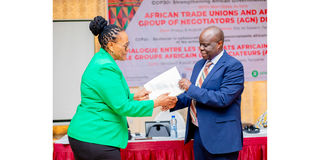Prime
Africa’s climate talks push for just, decolonised transition

Chair of the African Group of Negotiators (AGN) on climate change, Dr Richard Muyungi (right) receives a workers’ demand document from the president of the International Trade Union Confederation (ITUC)-Africa, Martha Molema, during a sideline meeting of the second AGN engagement with African trade unions in Dar es Salaam. PHOTO|COURTESY
What you need to know:
- Speaking during a dialogue between the African Group of Negotiators (AGN) and Africa’s trade union movement in Dar es Salaam, experts warned that climate justice could not be achieved without economic sovereignty.
Dar es Salaam. African climate negotiators and trade union leaders have joined forces to demand a “just transition” that not only addresses the climate crisis but also dismantles colonial-era economic structures that continue to shape the continent’s future.
Speaking during a dialogue between the African Group of Negotiators (AGN) and Africa’s trade union movement in Dar es Salaam, experts warned that climate justice could not be achieved without economic sovereignty.
Policy advisor and president of the Global Institute for Sustainable Prosperity, Prof Fadhel Kaboub, argued that the economic roles imposed during colonialism remain intact, keeping Africa trapped at the bottom of the global value chain.
“Colonialism was never designed for industrialisation, democracy or development. It was extractive, abusive and undemocratic,” he said.
Prof Kaboub said Africa was made the supplier of cheap raw materials, the consumer of industrial goods from abroad, and the recipient of obsolete technologies disguised as development — roles that persist today.
He warned that unless the structures are dismantled, the continent’s climate transition risks becoming “green colonialism,” with renewable projects and climate finance benefiting foreign investors rather than local communities.
Citing Africa’s vast renewable energy potential — enough to generate 1,000 times its current needs by 2040 — Prof Kaboub noted that the continent receives just one percent of global renewable financing.
Even then, he said, African nations are denied access to manufacturing technology, forcing them to export raw minerals for clean energy production abroad and import finished products at high cost.
He linked Africa’s climate vulnerability to its debt crisis, pointing out that the continent paid $163 billion in debt service last year — funds that could have been invested in climate adaptation and social development.
Africa’s trade patterns, Prof Kaboub added, remain structurally extractive, with exports worth $747 billion dominated by raw commodities and imports valued at $866 billion made up mostly of refined fuels, processed foods, pharmaceuticals and high-value manufactured goods.
This, he said, weakens currencies, raises the cost of essential imports and forces governments into foreign borrowing, with lenders dictating export-oriented projects that perpetuate the same extractive model.
AGN chair Dr Richard Muyungi said the partnership between negotiators and trade unions could strengthen Africa’s voice in global climate forums, including upcoming talks in Berlin — a decade after the Paris Agreement and just five years before the Sustainable Development Goals deadline.
“Just transition is not simply a negotiating process. It is about transforming lives, shaping the economy of the continent for generations, and meeting the expectations of our people. What we say in negotiations must reflect what Africans want to see happen,” he said.
Dr Muyungi stressed that climate action must go hand in hand with economic transformation, workers’ rights and long-term development goals, noting that input from civil society and labour movements would ensure negotiators truly represent the continent’s needs.




